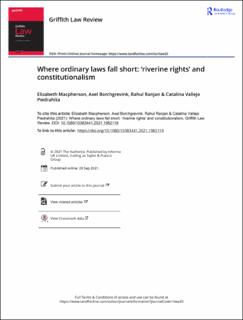| dc.contributor.author | Macphersomn, Elizabeth | |
| dc.contributor.author | Borchgrevink, Axel | |
| dc.contributor.author | Ranjan, Rahul | |
| dc.contributor.author | Vallejo Piedrahita, Catalina | |
| dc.coverage.spatial | Aotearoa New Zealand | en_US |
| dc.date.accessioned | 2021-10-29T12:06:57Z | |
| dc.date.available | 2021-10-29T12:06:57Z | |
| dc.date.created | 2021-09-29T12:48:29Z | |
| dc.date.issued | 2021-09-29 | |
| dc.identifier.issn | 1839-4205 | |
| dc.identifier.issn | 1038-3441 | |
| dc.identifier.uri | https://hdl.handle.net/11250/2826553 | |
| dc.description.abstract | Laws that recognise rivers and their ecosystems as legal persons or subjects with their own rights, duties and obligations have been associated with theories of environmental constitutionalism. However, the extent to, and manner in which, constitutional law (with its elevated status) has been instrumental in the conferral of these ‘riverine rights’ is still not well-understood. In this article, we consider the constitutional relevance of the recognition of rivers as legal persons or subjects in Aotearoa New Zealand, Colombia and India. We argue that in these three countries riverine rights are constitutional experiments: as small-scale, adhoc and ultimately incomplete attempts to transcend seemingly ineffective regulatory frameworks for rivers. However, they are also incremental, and influential, steps in a broader project of more fundamental social and environmental reform. | en_US |
| dc.description.sponsorship | This article was prepared with support of the Norwegian Research Council-funded project Riverine Rights: Exploring the Currents and Consequences of Legal Innovations on the Rights of Rivers. | en_US |
| dc.language.iso | eng | en_US |
| dc.publisher | Routledge | en_US |
| dc.relation.ispartofseries | Griffith Law Review; | |
| dc.rights | Attribution-NonCommercial-NoDerivatives 4.0 Internasjonal | * |
| dc.rights.uri | http://creativecommons.org/licenses/by-nc-nd/4.0/deed.no | * |
| dc.subject | Ecosystems | en_US |
| dc.subject | Rivers | en_US |
| dc.subject | Environmental constitutionalism | en_US |
| dc.subject | Legal recognition | en_US |
| dc.subject | Environmental issues | en_US |
| dc.subject | Legal subjects | en_US |
| dc.subject | New Zealand | en_US |
| dc.title | Where ordinary laws fall short: ‘riverine rights’ and constitutionalism | en_US |
| dc.type | Peer reviewed | en_US |
| dc.type | Journal article | en_US |
| dc.description.version | publishedVersion | en_US |
| dc.rights.holder | © 2021 The Author(s) | en_US |
| cristin.ispublished | true | |
| cristin.fulltext | original | |
| dc.identifier.doi | https://doi.org/10.1080/10383441.2021.1982119 | |
| dc.identifier.cristin | 1940534 | |
| dc.source.journal | Griffith Law Review | en_US |
| dc.source.pagenumber | 1-36 | en_US |
| dc.relation.project | Norges forskningsråd: 301916 | en_US |

